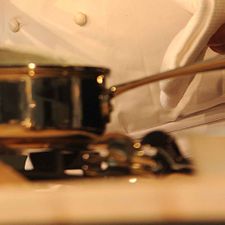Classical concerts are great. Stop apologizing for them.
This week my Facebook feed was barraged with angstful hand-wringing over comments by Radiohead’s Jonny Greenwood, who told the BBC he finds classical concerts “off-putting.” Greenwood wasn’t dissing classical music—he performs it, after all—but he felt like classical concerts should model their formats after indie rock shows.
A host of blog responses popped up with suggestions on how to “improve” classical concerts: encouraging people to clap between movements, getting rid of formal attire, tuning back stage, and so on and so forth—nothing original, nothing useful, and all of it completely missing the point.
Look, classical concerts are off-putting—to some people. Any type of concert is going to be unappealing to somebody. But off-putting-ness is a feature, not a defect. That’s why teenagers perennially hate their parents’ music and vice versa. If your concert doesn’t put off someone, you’re doing it wrong. Yet for some reason, in the classical world we try to be all things to everyone. That, in my opinion, is the only real thing wrong with classical concerts.
So in the spirit of getting our collective hands unwrung, I’m going to deconstruct one of the most egregiously wrongheaded “fix lists” I saw on Facebook this week: conductor Baldur Brönnimann’s 10 things that we should change in classical music concerts. Brönnimann gets it wrong on nearly every count, demonstrating some of the most common ways classical presenters shoot themselves in the foot.
1. The audience should feel free to applaud between movements
This is one of the most common “fixes” people propose for classical music, and it makes the least sense. It’s not like clapping is the primary reason people enjoy concerts. If that were true, they’d be beating down the doors to the jazz clubs, where clapping after every solo is de rigueur.
Every musical experience has its own culture. At an indie rock show, you stand on a dance floor and cheer. At a classical concert, you sit in a chair and refrain from clapping between movements. Learning the culture of the event is one of the great joys of concert-going. The specifics don’t matter, but you feel good when you’re part of a group and everyone’s following the unwritten rules together. So who knows? Maybe someday it will become the norm to clap between movements, but encouraging people to clap (or not) isn’t going to change anything.
2. Orchestras should tune backstage
Why? People enjoy watching an orchestra tune. It’s humanizing to see the musicians getting ready, instead of simply having them walk on stage to play without any context. Orchestral tuning is also one of the most iconic markers of a classical performance. It’s both comforting and thrilling, because no other concert experience starts the same way.
3. We should be able to use mobile phones (in silent mode)
The lights from a mobile phone are extremely distracting in a concert, just as they are in a movie theater. People are chained to their phones 24/7, we don’t need to encourage more of that. Concerts (and movies) should be an escape from the glowing screen.
4. Programs should be less predictable
Brönnimann doesn’t think the entire program should be written down and handed out to the audience; he thinks certain pieces should be left as a surprise. Okay, sure—change things up, whatever. But there should be a method to your madness. Unpredictability and surprise can be useful elements in programming, but in the process you give up other things. For instance, lots of people enjoy reading about the pieces, performers, and composers in their programs. Others come to hear specific works or soloists, not just because your ensemble is playing. You lose those advantages when you don’t announce your programming, so you’ll need to make up for them in other ways.
5. You should be able to take your drinks inside the hall
I’m okay with that, as long as straws are not allowed.
6. The artists should engage with the audience
Yes, of course, but in an ensemble you can delegate. Not everyone needs to be a spokesperson. After all, it’s not like George Harrison torpedoed the Beatles’ success by being an introvert. The beauty of a group of musicians working together is that everyone brings different skills.
7. Orchestras shouldn’t play in tail suits
These days, everything is informal. Especially here in SF, it’s not even safe to assume people will dress up for weddings. So when classical ensembles put on their penguin suits, it makes the concert stand out from everything else. And when it comes to entertainment choices, people go for things that stand out. As I’ve written before, you’ll never be able beat out Netflix on ease and accessibility—there’s just too much competition for people’s time. You have to compete on uniqueness.
I’m on the board of a young chamber group called Elevate Ensemble. One of the reasons I got involved with them is because founder/music director Chad Goodman gets this stuff. He insists on a rigorous dress code for his musicians, and he presents the concerts as serious, formal affairs that you should dress up for. Elevate’s approach isn’t the typical, “Look, we’re just like the cool kids! We play in hoodies and jeans too!” Instead, Elevate projects something more like, “Our shit is badass, take it seriously.”
The conventional wisdom would tell you that Elevate should be playing to empty halls. But guess what? Despite programming new music and challenging repertoire, Elevate plays to full houses, with an audience that’s almost entirely drawn from that coveted demographic of non-musicians in their 20s and 30s. True, it’s still a young group and anything could happen, but in a short time Elevate has managed to build a loyal audience—not by making things convenient, but by demanding that the audience rise to its standard.
8. Concerts should be more family friendly
Why? So parents can feel obligated to drag their kids along, and kids can decide that classical music is “that lame music that mom and dad make me listen to”? You don’t see punk bands trying to attract grandmothers. Stop pretending your concerts are for everyone. Be honest about who you’re programming for, then make a program those people will like.
9. Concert halls should use more cutting-edge technology
Concert halls do use cutting-edge technology! The acoustics of modern halls are light-years beyond the halls of decades past. We’ve also got better lighting, access to video projection, a range of options for scrims and supports, quality amplification, and a host of other tools at our disposal. But technology alone won’t save you. People don’t come to concerts to get some half-baked iPhone app or to see you project your screen saver onto the wall. They come for great musical experiences. Classical concerts should use the right technologies, not more technologies.
10. Every program should contain a contemporary piece
The “eat your vegetables” approach to programming isn’t going to win you any friends. As a composer I’d obviously like to see more new music on concerts, but that doesn’t mean every program should have a contemporary piece. The classical tradition is enormously broad and varied, and people are entitled to like whatever they like. So get off your soapbox and focus on putting on good programs. That’s a much better way to win the hearts of audiences.


